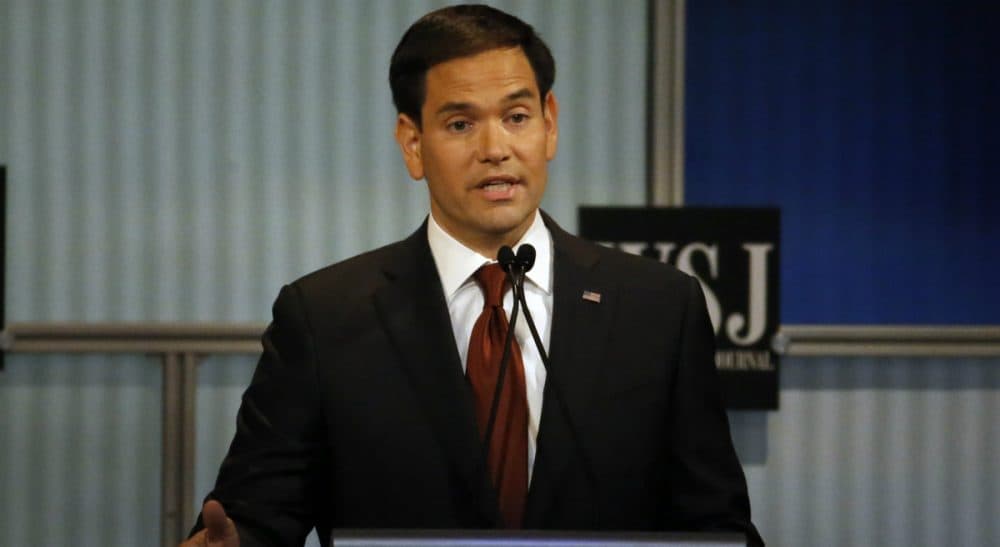Advertisement
Rubio Vs. Plato: A Defense Of Philosophy, And The Humanities In General

If you’re going to attack philosophy, you ought to come armed with a decent argument.
At last week’s GOP debate, Sen. Marco Rubio stated, “Welders make more money than philosophers. We need more welders than philosophers.” He lamented the stigmatization of vocational school and claimed that higher education, and specifically, it would seem, the humanities, fail to equip today’s students with “21st century skills.”
The most obvious rebuttal is to point out that Rubio’s statement is simply false. People with associate’s degrees in welding technology earn significantly less than those with bachelor’s or master’s degrees in philosophy. (Sure, when we factor in debt, the discrepancy will be smaller for a while, but it won’t even out, much less reverse.)
While arguing against the stigmatization of vocational school (rightly so), Rubio stigmatizes the study of philosophy...
While Rubio’s misinformation deserves pointing out, I want to focus instead on what I see to be the spirit of his claim, not the letter. While arguing against the stigmatization of vocational school (rightly so), Rubio stigmatizes the study of philosophy, and the humanities in general. This stigma is a staple of Republican anti-intellectual rhetoric, and commonplace among the public generally.
What counts as a “21st century skill”? Presumably, something that yields results. There is a popular idea that philosophy yields no results because it happens in the mind; it begins and ends, supposedly, with thoughts that spark to life and fizzle out in the heads of those who practice the discipline.
I can’t tell you how many times people have asked me what the hell I’m going to do with my bachelor’s degree in philosophy. I tell them that I’ve already done a lot with it. I think more critically and clearly than before, which may sound like a rather abstract result, but it has concrete implications. I use the analytical, argumentation and writing skills I gained in college nearly every day as a freelance writer. I use that education to write about very real social and political issues of the day. And I plan to study political philosophy in graduate school to examine how rhetoric influences public opinion, particularly political rhetoric that misleads the public and creates artificial divides between groups of people (for example, the rhetoric that frames intellectual skills as less valuable than, say, welding skills).
The skills fostered by philosophy education are as valuable today as ever, if not more so. Political discourse is tremendously divisive; public education suffers a dearth of critical thinking cultivation; the whirlwind of fact and opinion and information and misinformation on the Internet and in the media is difficult to navigate; the decisions that impact our lives and the lives of others are increasingly complex. The intellectual skills fostered by humanities education enable people to identify and question assumptions, assess values, analyze what factors underlie today’s problems and weigh solutions.
We need thinkers every bit as much as makers. Both possess timeless skills (and some people possess both -- there’s no necessary dichotomy here).
Perhaps that is still too abstract for Rubio et al. But there are plenty of examples of how philosophy has impacted, and continues to impact, the world in concrete ways. The U.S. Constitution would not read as it does without the influence of John Locke’s ideas of natural rights. The thought of Karl Marx and Friedrich Engels led to the development of a socioeconomic system that has been implemented in many parts of the world. Jean-Jacques Rousseau’s philosophy of freedom was highly influential during the French Revolution. Without philosophers like Mary Wollstonecraft and John Stuart Mill who initially questioned women’s subjugation, and the continued work in this area throughout the 20th century on, I might be too busy tending to a horde of children and housework to write this. Today, social and political philosophers are helping shape the conversation and raise consciousness around race and class and sex and LGBTQ issues that continue to divide and oppress. These are only a few examples of the concrete results of philosophical thought.
We need thinkers every bit as much as makers. Both possess timeless skills (and some people possess both — there’s no necessary dichotomy here). Rubio’s use of anti-intellectual rhetoric to turn people against one another and undervalue those whose skills are primarily intellectual is an example of one reason why we absolutely need philosophy — to point out such erroneous thinking.
